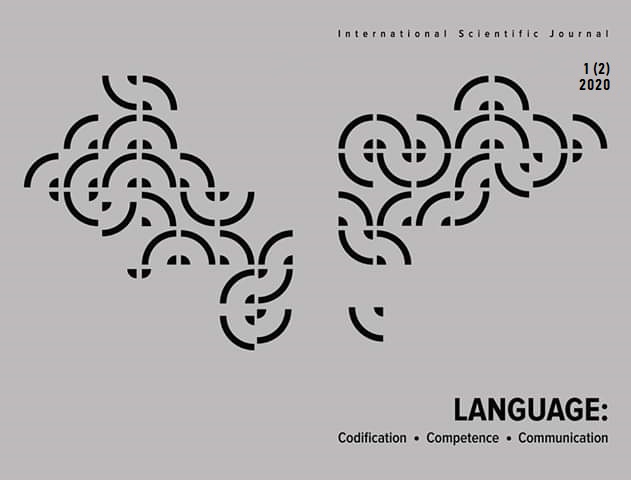THE CONCEPT OF PATRIOTISM IN THE UNDERSTANDING OF RUSSIAN-SPEAKING YOUTH FROM THE EAST OF UKRAINE AND THE CRIMEA
DOI:
https://doi.org/10.24025/2707-0573.1(2).2020.200195Abstract
Background. The Ukrainian politicians and mass media actively discuss the thesis that you can love your country but not speak Ukrainian. In this context, the question of the content of the concept «patriotism» from the point of view of Russian-speaking youth becomes relevant.
Purpose. The purpose of this article is to find out whether young migrants from the Donbass and Crimea consider themselves patriots, what affects their self-identification, how they understand the term "patriotism" and whether, in their view, Ukrainian is a component of this concept.
Methods. The language biography method was used to collect the material. 20 interviews of young (17-28 years old) migrants from Donbass and Crimea who currently reside in Kyiv were analyzed. The informants answered the question «Do you consider yourself a patriot?»
Results. It has been found that Russian-speaking youth often do not call themselves patriots because they do not speak Ukrainian and do not support nationalists. In addition, it is important for young people to express their love for the Motherland through real actions. Driven largely by pragmatic motives migrants often put in the concept «patriotism» symbolic content. The informants' answers do not contain some of the patriot features represented in the dictionary definitions: responsibility for the Motherland's fate, readiness to sacrifice something for the sake of their nation.
Some of the informants hesitate to answer because they cannot identify themselves with only one state. The results of the study reveal the problem of Russian-speaking youth national identity. Many of the respondents have not a national but global or regional identity. At the same time, most connect their future with Ukraine.
Discussion. According to young Russian-speaking migrants’ opinion, the main components of the concept of «patriotism» are 1) communication in Ukrainian; 2) support for nationalist ideas; 3) the desire to live in Ukraine, despite the difficult socio-economic situation in the country; 4) love for the Ukrainian language, culture, traditions. The study identifies the need for targeted mass surveys in environment of Russian-speaking youth from different regions of Ukraine.
Keywords: patriotism, migrants, Ukrainian language, nationalism, identity.
Published
Issue
Section
License
Copyright (c) 2020 Ivanna Mykolajivna Tsar

This work is licensed under a Creative Commons Attribution-NonCommercial 4.0 International License.
Authors hold full copyright and at the same time they transfer the publishing rights to the journal. The author of a published article has the right to distribute it, post the work in the electronic repository of his/her institution, publish as a part of a monograph, etc. with a required link to the place (output) of its first publication.
The authors confirm that the scientific article submitted for publication has not previously been published and has not been submitted to the editorial office of other journals.
If you have any questions, please contact us:
email: ukrmova@chdtu.edu.ua, o.pchelintseva@chdtu.edu.ua
Viber / WhatsApp: +38 093 789 09 27


